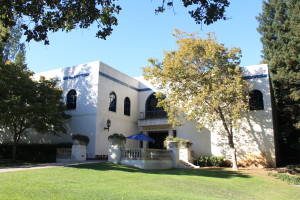
The F.W. Olin Library is now open to all members of the general public.
After considering feedback from the Mills community, the F. W. Olin Library has opened up the physical space and on-site materials to the general public.
The Library staff will no longer check I.D.s upon entrance, and the public can now access the materials to use on-site and remain in the building until 6 p.m. The use of computers, printing services, database access and the ability to check out books and other materials is still reserved for Mills affiliates only.
Library Director Janice Braun says that the staff is constantly looking for ways to improve their services.
“We determined that checking identification was not the best use of staff time, that it was not in keeping with best practices, and that it was troubling to many of our library users,” Braun said.
Senior Hannah Lu-Way believes that the new policy is a good idea, and that the inconsistent I.D. checks could have made students feel unwelcome.
“They could have had a better method,” Lu-Way said. “They were not consistent with it. I could see that as an opportunity for biases to slide in.”
The Library staff used to check student I.D.s in the evenings and during weekends, and the new policy will eliminate any uncertainty over the I.D. checks.
“That inconsistency created a great deal of confusion,” Braun said.
When creating the new policy, which was approved by the Provost and College Officers, the Library staff and director looked at policies of other liberal arts colleges in the Oberlin Group, which the F.W. Olin Library is a part of.
“Our new policy is more in keeping with other college libraries throughout the country,” Braun said.
Senior Sierra Green considers that the process of checking I.D.s can be faulty, and supports the decision to open the Library to the general public.
“I think there’s no way of having a perfect protocol,” Green said. “Institutions of higher education can be very exclusive and so making knowledge accessible to the public is generally a good thing.”
Lu-Way agrees that the Library should be open for the general public to use.
“For people who grew up in Oakland and live nearby, they deserve to read the books,” Lu-Way said. “Ultimately, this school was built on native land so we should open it up as a public space.”
With the Library open to the general public, there is hope that it could help integrate Mills more into the outside community.
“The greater community will be able use the Library as a resource and hopefully feel welcomed by the campus. There may be an enhanced awareness of our campus that could influence enrollment, fundraising, etc,” Braun said.
Lu-Way welcomes the idea of the general public using the Library along with the Mills students.
“I don’t mind sharing,” Lu-Way said. “Most of those books just sit on the shelves.”
Green sees the new Library policy as having potential to get more people on-campus and generate more interest in Mills.
“I know not everyone outside of Mills is aware that it’s even a campus people can enter,” Green said. “But for those that do, and hopefully as more people learn that, we’ll have more people that come and learn and stay.”
The opening up of the Mills campus is something that Lu-Way embraces, as she believes that it will help Mills assimilate into the greater Oakland community.
“Mills does a good job of trying to make itself look perfect to the outside world, so I think it’s a step in the right direction to build community,” Lu-Way said. “I think it’s good to open this bubble up a little more.”
